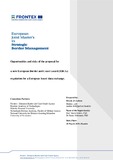Opportunities and risks of the proposal for a new European Border and Coast Guard (EBCG) regulation for a European based data exchange.
Kokkuvõte
The idea for this study was developed by the author in close cooperation with the German Federal Police Headquarters. The author, who is the Head of a Police Custom Cooperation Centre (PCCC) in southern Germany, is familiar with border police management and has been working successfully in international police cooperation for more than ten years. Based on his own experiences in the field of cross-border police work and lessons learned from a case study, the author has identified weaknesses in the cross-border dissemination of information at the EU level amongst EU authorities. The intention of this study was to examine the Commission proposal in terms of data sharing with regard to the responsibilities and the possibilities for effective cooperation between the acting key players in the fight against border-crossing crime at the external European borders.This study is referring mainly to personal data, because the problems of cross border crime can only be tackled when optimizing the exchange of personal data. However,having in mind that FRONTEX also processes strategic and operational, non-personalized data.
Kirjeldus
1. Introduction ; 1.1. Context and proposed problem ; 1.2. Goal and research question ; 1.3. Target ; 2. Literature Review ; 2.1. Information sharing ; 2.2. Shared responsibilities ; 2.3. Police cooperation within the EU ; 2.4. Cooperation with Third Countries (TCs) ; 2.5. Information exchange systems at external borders ; 2.6. Data protection issues ; 2.7. European efforts for data exchange and data protection ; 3. Research Methodology ; 3.1. Research design ; 3.2. Data collection ; 3.3. Data analysis ; 3.4. Research quality indicators ; 3.5. Ethical considerations ; 4. Analysis and Results ; 4.1. Findings from desk research ; 4.2. Findings from field visit ; 4.2.1. Description of the JO ; 4.2.2. Main outcomes from the observation of GOs, FRONTEX Support Officer (FSO) and Local Coordinators (LC) of the hosting EU MS ; 4.3. Findings from interviews and focus group according used statements ; 4.3.1. Information exchange and cooperation (Chapter II, Section 2) ; 4.3.2. Cooperation within EU bodies (Chapter II, Section 11, Sub Section 1) ; 4.3.3. Cooperation with Third Countries (Chapter II, Section 11, Sub Section 2) ; 4.3.4. Personal data processing (Chapter IV, Section 2) ; 5. Fundamental rights considerations ; 6. Discussion of Results, Conclusions and Recommendations ; 6.1. Conclusions ; 6.2. Recommendations



